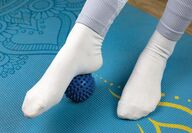Sorted by date Results 1 - 25 of 155

Taking the drug Ozempic and other drugs in this class may help you live longer. With GLP-1 drugs dominating headlines for their impact on weight loss and metabolic health, new discussions around their potential role in extending healthy lifespan are emerging. Dr. Christoph Westphal, co-founder and general partner of Longwood Fund, said the biotech industry is partnering with physicians and the result is rather remarkable. “Within three or four or five years, if we can prove that with GLP-1s y...

At-home urine test for prostate cancer Researchers at Vanderbilt and the University of Michigan are now reporting that they have come up with a simple at-home urine test for prostate cancer screening. Traditional prostate cancer screening with PSA testing and biopsy has been shown to lead to unnecessary procedures and overdiagnosis of low-grade cancers, according to researchers Dr. Jeffrey Tosoian, an assistant professor of Urology and director of Translational Cancer Research at Vanderbilt...

Health is the first wealth is a philosophy that has been around for centuries. However, health now refers to body, spirit and mind in a different way than it did before the age of technology. Mental health experts say we all have "joy resources" and we need to manage them properly. Valentina Ogaryan, clinical director of the Simms/Mann UCLA Center for Integrative Oncology, said it's best to eat whole foods and incorporate some type of physical activity on a routine basis. "It's also about...

New approach to lower back pain Lumbar spinal stenosis (LSS) is a common cause of lower back pain in a large number of older adults. Now, a study out of the University of Florida is showing that a minimally invasive procedure, known as mild®, provides pain relief and improved physical function for at least a year in adults suffering from lower back pain. The study followed 136 men and women between the ages of 16 and 89 who underwent the mild® procedure. It is designed to reduce pressure on the...

Medication may reduce the risk of Alzheimer’s disease Researchers at the Case Western Reserve School of Medicine have found that when compared to seven other anti-diabetic drugs, semaglutide, a popular diabetes and weight-loss drug, may lower the risk of Alzheimer’s disease in people with type 2 diabetes. Semaglutide, a glucagon-like peptide receptor (GLP-1R) molecule that decreases hunger and helps regulate blood sugar, is also the active component in the diabetes and weight loss drugs Wegovy a...

Goodness gracious, we are so blessed Showing gratitude may pack some important hidden long-term health benefits. A recent study from Harvard T.H. Chan School of Public Health is suggesting that experiencing gratitude may help older adults live longer. “Prior research has shown an association between gratitude and lower risk of mental distress and greater emotional and social wellbeing. However, its association with physical health is less understood,” said lead author Ying Chen, a Harvard res...

At-home detection of heart failure Heart failure is a leading cause of death worldwide and now researchers hope to combat it in a whole new way. They have developed a point-of-care electrochemical biosensor that can measure levels of two biomarkers for heart failure in as little as 15 minutes from just a drop of saliva. “Our device would be ideal for people, who are at high risk for heart failure but have limited access to a hospital or a centralized lab,” said developer Trey Pittman, who is...

Watches commonly monitor ‘heart rate variability’ Wearable clothing can measure several aspects of health, including heart rate variability. So, what does it mean if your heart rate variability is high or low? Cardiologist Dr. Elijah Behr with Mayo Clinic Health in London said that oftentimes your watch or wearable device is measuring the balance of nerve activity in the body and the way it relates to your heart rate and blood pressure. The nerve system that heart rate variability relates to...

Staying healthy at 35,000 feet If you are planning on flying and debating whether to wear a mask, it is best to know the facts. Infectious disease expert Dr. Clark Abraham, who is with the New York Institute of Technology College of Osteopathic Medicine, said some people may be surprised about the risk of germ spread on most airplanes. “Commercial airplanes contain high efficiency particulate air (HEPA) filter systems, which exchange the air rapidly. In general, the risk of spreading an a...

New machines measure back surgery benefits Researchers who have been using Fitbit data to help predict surgical outcomes have now come up with a new method to more accurately gauge how an individual may recover from spine surgery. Using machine learning techniques developed at the AI for Health Institute at Washington University in St. Louis, Missouri, the team developed a novel way to predict recovery more accurately from lumbar spine surgery. This latest model has outperformed previous models...

Preventing memory loss on a daily basis When it comes to your brain, use it or lose it. The harder your brain works at your job, the less likely you may be to have memory and thinking problems later in life, according to a new study published in the journal Neurology. The study does not prove that stimulating work prevents mild cognitive impairment (MCI). It only shows an association. “We examined the demands of various jobs and found that cognitive stimulation at work during different stages i...

A chatbot app to quit smoking Researchers in Seattle, Wash. have now developed an artificial intelligence (AI) -powered chatbot app called QuitBot to help more people successfully quit smoking cigarettes. The app is available for free on Apple and Android devices and is a comprehensive app that provides users personalized support. Developed using scientifically backed answers vetted by scientists and experienced smoking cessation clinicians, QuitBot combines evidence-based structured conversatio...

Music’s healing properties: Don’t worry be happy Whether it’s singing in a choir, playing the living room piano, joining in hymns at church, or just whistling along with the radio, a new poll finds that nearly all older adults report music brings them far more than just entertainment. Three-quarters of people age 50 to 80 say music helps them relieve stress or relax and 65% say it helps their mental health or mood, according to a new poll on healthy aging from the University of Michigan. The sur...

New wearable robotics for Parkinson’s disease “Freezing,” a temporary, involuntary inability to move, is one of the most common and debilitating symptoms of Parkinson’s disease, a neurodegenerative disorder that affects more than 9 million people worldwide. When individuals with Parkinson’s disease freeze, they suddenly lose the ability to move their feet, often mid-stride, resulting in a series of staccato stutter steps that get shorter until the person stops altogether. These episodes...

Improving brain health through exercise A new study is suggesting a fascinating link between regular exercise and better brain health. Researchers looked at 10,125 Individuals with MRI brain scans and found that being physically active is related to increased size of brain areas important for memory and learning. The study revealed that those who regularly engaged in physical activities such as walking, running or sports had larger brain volumes in key areas. This includes the gray matter,...

Drones equipped with defibrillators may help save lives Researchers have evaluated the possibility of alerting drones equipped with automated external defibrillators (AED) to patients with suspected cardiac arrest. In more than half of the cases, the drones were ahead of the ambulance by an average of three minutes. In cases where the patient was in cardiac arrest, the drone-delivered defibrillator was used in a majority of cases. Swedish researchers at Karolinska Institutet evaluated the use...

New help for those with low vision or blindness Australian researchers have developed a new type of technology known as acoustic touch and it helps people “see” using sound. The technology has the potential to transform the lives of those who are blind or have low level vision. Researchers from the University of Technology Sydney and the University of Sydney have developed new smart glasses that translate visual information into distinct sound icons. “Smart glasses typically use computer visio...

New nasal spray for rapid heartbeats A fast-acting medication delivered as a nasal spray may soon allow individuals with intermittent rapid heartbeats to treat the problem themselves as soon as they develop symptoms, according to a new study. This new medication is still waiting approval from the U.S. Food and Drug Administration (FDA). “This is a potential new and exciting option for patients to safely self-treat their rapid heartbeat without direct medical supervision to avoid emergency r...

Discount cards with Amazon and GoodRx versus out of pocket payments A nationally representative study is suggesting that at least one out of five prescriptions for commonly prescribed generic medications are cheaper through Amazon Prime or GoodRx Gold discount cards compared to actual out-of-pocket payments made by patients. The authors also highlight the disproportionately higher frequency of out-of-pocket payments exceeding discount card pricing for various vulnerable subgroups like the...

Olive oil packs powerful punch against dementia Switching your cooking oils to olive oil may have important hidden brain benefits. A new study is suggesting that incorporating olive oil into your diet may help reduce the risk of dying from dementia. As many countries face rising rates of Alzheimer’s disease and other forms of dementia, the study offers hope that healthy lifestyle factors such as diet can help to prevent or slow the progression of brain deterioration. “Our study reinforces die...

Alaskan Native men warned about lack of screening for prostate cancer Men in Alaska age 50 or older may want to discuss prostate cancer screening with their healthcare provider. A new study from Wake Forest University School of Medicine is suggesting that American Indian and Alaska Native men are less likely to be screened for prostate cancer compared to other racial/ethnic groups and it is coming with a high price tag. The study appears in the online journal called Cancer Causes & Control, and...

Adopting some self-care techniques may reap huge health benefits. Self-care is defined as the process of establishing behaviors to ensure holistic well-being of oneself. It is about taking the time to really understand your true needs beyond just impulses. We all engage in some form of self-care daily with food choices, exercise, sleep, reading, and so forth. However, self-care also involves a person's spiritual and social well-being. Origins and concepts The concept of self-care has ancient...

New pill may help prevent knee and hip replacements A new study is suggesting that a low dose of colchicine may be associated with lower incidences of both total knee replacement and total hip replacement surgeries. The analysis, published in Annals of Internal Medicine, suggests this might be a simple and safe way of lowering the risks for knee and hip replacements. Osteoarthritis is an increasingly common joint disease that can be associated with low-grade inflammation in response to...

Forget about dieting. A new electrical “pill” may be able to regulate a person’s appetites without any drugs or invasive medical procedures. It is a promising advance in treating eating disorders and other medical conditions that benefit from adjusting someone’s food intake. Developed by a research team from NYU Tandon School of Engineering and the Massachusetts Institute of Technology (MIT), the pill has been dubbed FLASH. It delivers electrical impulses to the stomach lining once it’s sw...

COVID-19 transmission continues to occur in many communities across Alaska, although overall case counts continue to slowly decline, according to state officials who are tracking the virus. Most COVID-19 infections in Alaska at this time are caused by viruses belonging to either the XBB.1.5 lineage or to BQ lineages. While many infections with the virus that causes COVID-19 are not detected or reported, changes over time in the number of reported cases still provide useful information about the...